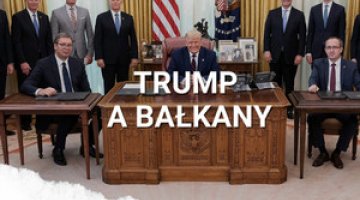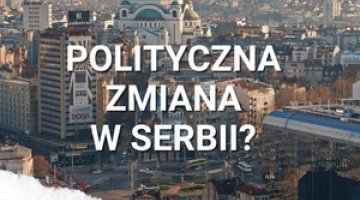Tension on the Serbia-Kosovo border escalates: the crisis has been resolved but the problem is still present
The conflict between the government in Pristina and the Serb minority in Northern Kosovo has escalated over the past few weeks. The Serb minority in Northern Kosovo refuses to recognise the central government’s authority and is supported by Belgrade. Protests erupted on 25 July, following the Kosovar government’s attempts to take control of the Brnjak and Jarinje border checkpoints. The agreement reached as a result of negotiations on 3 August between the commander of NATO’s KFOR force and the governments in Belgrade and Pristina, under which KFOR troops will control border checkpoints between Kosovo and Serbia, will temporarily stabilise the situation on the Serbian-Kosovar border.
However, this does not solve the question of the status of the four Serb municipalities, which the government of Kosovo has no control over. A durable stabilisation of the region will not be possible unless the main problem, namely the normalisation of relations between Serbia and Kosovo, is resolved.
The tension is escalating
On 20 July, the government in Pristina imposed an embargo on imports of products from Serbia. This decision was taken in response to the cancellation of another round of Serbia-Kosovo talks during which the free movementof goods was to be addressed. Serbia has been blocking the transit and import of Kosovar goods since the proclamation of independence by Kosovo in 2008. However, the Kosovar government was unable to enforce the ban at the Jarinje and Brnjak border checkpoints located in Northern Kosovo (inhabited by the Serb minority) which were controlled by Kosovar police officers of Serb background. Therefore, the government decided to send special police units and Kosovar customs service officers to these two checkpoints on 25 July. This move met with a sharp reaction from the Serb community, who blocked the roads leading to the border checkpoints. One of the policemen was killed and the Kosovar units were forced to retreat as a consequence of the riots. Additionally, on 27 July, a group of football fans, most probably of an ethnic Serb background, linked to nationalist organisations vandalised the checkpoints in Jarinje. As a result, control of the border crossing points was taken over by NATO’s force, KFOR, to be reinforced with a German-Austrian Operational Reserve Force. Access to the two checkpoints was however still being blocked by Serbs.
Pursuant to the agreement which the KFOR command reached as a result of negotiations on 3 August with the governments of the two countries, the border crossing points will remain under the control of NATO troops until at least September this year, and Serbs are to cease blocking the access roads leading to the state border. At the same time, the two checkpoints were closed for trucks carrying goods (only vehicles under 3.5 tonnes will be allowed to cross the border). KFOR is to make sure that the provisions of the agreement are observed.
The background of the conflict
Four Serb municipalities, with a population of around 40,000–60,000, are located in Northern Kosovo. This area has never been controlled by the central government of Kosovo. Most institutions here are financed by the Serbian government (schools, the health service, the police and the courts). However, since the proclamation of independence, the Serbian administration has been unable to effectively control these institutions. At the same time, local Serbs are rejecting any possibility of subordination to the government in Pristina, which has failed to develop any strategy for including them in the state structures. As a consequence, Kosovo is unable to control its border and the border and customs checkpoints located in this area, and to exercise power across the country as a whole. In effect, Northern Kosovo is beyond the control of any state authorities. The government in Pristina hoped it would be able to extend its authority also to the Serb municipalities with the aid of the EULEX mission, which was to supervise the introduction of the rule of law.EULEX was however unable to bring about a reopening of the court in Serb-controlled Mitrovica or to effectively exercise border and customs control at the Jarinje and Brnjak checkpoints. Any attempts at creating institutions subordinated to Pristina met with protests from the Serb population. As a result, EULEX took no further action to this effect.
The unresolved issue of Northern Kosovo gives rise to problems at many levels in both countries. Firstly, it hinders the reform process, because the political elite of Kosovo and Serbia are focused on protecting their respective interests in this area. Recurring incidents also help distract the attention of the public away from internal problems. This issue also adds to the political capital of radical groupings, which are making efforts to torpedo any compromise-based solutions of disputes between Belgrade and Pristina. The lack of institutions capable of the effective enforcement of the rule of law also facilitates the operation of criminal groups. The lack of border control contributes to the import of goods to Kosovo without customs duties or taxes imposed. All this contributes to the development of a grey economy in Kosovo and to the emergence of non-transparent links involving corruption in both countries. Thus the effective combating of corruption and organised crime is prevented. Uncontrolled imports also cause serious problems with maintaining the stability of Kosovo’s budget since customs duty accounts for 70% of budget revenue. According to Kosovar officials, the treasury loses approximately 30–40 million euros (3% of budget revenues) annually due to customs duty evasion alone.
In turn, Serbia is using Pristina’s inability to control the country as a whole to discredit the independence of Kosovo. Increasing public dissatisfaction and the problems of the Serb minority in Kosovo, who are deprived of effective state institutions and basic economic security, are being used by Serbian parties and provide a tool to put political pressure on Pristina. Neither of the two countries seems to be interested in improving the situation on the ground.
The shadow of Serbia-Kosovo negotiations
The actions taken by the government in Pristina need to be seen in the context of the Kosovo-Serbia negotiations which have been conducted under the auspices of the EU since March this year. The negotiations concern technical issues: the free movement of people and goods, the supply of electric power, civil, land and mortgage registers. The EU hopes that the talks will allow an atmosphere of mutual trust to be created in Belgrade and Pristina and will normalise bilateral relations. So far, a compromise enabling the free movement of people and the delivery of copies of civil registers to the Kosovo administration has been achieved.
However, the commencement of talks with Belgrade is giving rise to increasing resistance from the political opposition and the society in Kosovo. According to opposition parties, the negotiation areas proposed by the EU undermine Kosovo’s independence and sovereignty, and should not be a subject of negotiations at all. They also believe that the government was unprepared for the talks and, having no tools to apply pressure on the Serbian government whatsoever, was hoping that the EU would force Belgrade to make concessions, using its aspirations of EU membership. Meanwhile, as the opposition claims, EU member states are more favourably disposed to the realisation of Serbian interests, and the talks are only aimed at proving Belgrade’s good will and enabling Serbia to be granted EU candidate status and not at resolving the problems (for example, introducing Kosovar institutions in the Serb municipalities) or causing the recognition of Kosovo’s independence. The opposition’s resistance has been reinforced due to Belgrade’s proposals that the negotiations should also include the issue of Northern Kosovo’s status and, for example, making these areas part of Serbia, which seriously infringes upon the territorial integrity of the state. The cancellation of another round of the talks which were to address the free flow of goods gave rise to a new wave of criticism.
The short-term success of the Kosovar government
Given the increasing pressure from the public and the opposition, and the lack of major successes in the negotiations with Serbia, the government decided to take measures aimed at reinforcing its position at home and on the international arena before the next round of talks with Serbia. The imposition of the embargo and the attempt to gain control of its territory and borders were to prove at home that the Kosovar government was unrelenting in dealings with Belgrade and determined to protect the integrity and independence of Kosovo.
The government also hoped to reinforce its position in dealings with Serbia by taking over control of the border checkpoints. If the flow of Serbian goods were blocked (the value of exports in 2010 reached 290 million euros), this first of all would inflict losses on the Serbian economy and give rise to protests among business circles. Secondly, this would make Belgrade’s assistance to the Serb minority impossible, upset the economic grounds of the existence of this social group which derives benefits from untaxed imports and would make contacts with Serbia more difficult. Thirdly, this would allow Kosovo’s budget revenues to increase significantly. If KFOR troops control the observance of the agreement of 3 August, this will mean that the Kosovar government has achieved these goals. At the same time, the government has obtained an effective tool to put pressure on Belgrade, which must take into account the opinion of Serbian business circles and the situation of the Serb minority, which is likely to deteriorate. Consequently, this may force the Serbian government to make concessions.
The unilateral actions taken by the government in Pristina have been criticised by EU institutions and member states and the USA. In the longer term, this may adversely affect the image of the government, which in the opinion of some EU member states is becoming less and less reliable and predictable a partner. This may also significantly impede its co-operation with the EU’s mission- EULEX, and with the EU itself, and thus deprive Kosovo of the chance for EU integration. The EU’s support is also necessary for the normalisation of relations with Belgrade. On the other hand, given the deadlock over Northern Kosovo, some countries, including the USA, the United Kingdom and Germany, seemed to have taken an approving stance on the recent moves made by the Kosovar government.
The Serbian government’s dilemma: Kosovo or the EU?
A top priority task for the government in Belgrade is to be granted EU candidate status, which will primarily depend on the European Commission’s report to be published this autumn. For this reason, Belgrade has been making efforts to avoid any escalation of tension in Northern Kosovo and to show its good will in the pending negotiations with Pristina. The Serbian government has dissociated itself from the border incidents and is trying to mediate between the Serb minority and international institutions. At the same time, in view of the upcoming parliamentary elections (spring 2012), the government may not cease to defend Serbian interests in Kosovo because this issue is still important to the electorate. For these reasons, the government will make attempts to find a balance between the mutually contradictory expectations of the Serbian public and the EU. Belgrade’s concessions to Kosovo will greatly depend on pressure from the EU and the stance taken by its member states on the normalisation of Serbia-Kosovo relations.
Possible developments
At present, the governments of Kosovo and Serbia both want the tension to decrease in the frontier regions and for the negotiations to be continued under the auspices of the EU. The next round of the talks has been scheduled for 5 September. The way it is held and the measures taken by the international community will decide on the further development of the situation. The Kosovar government has not ruled out that if no compromise is reached, it will take further action to reduce Serbian influence in the northern part of its country.
Since the EU has not managed to develop a solution which would allow Kosovo’s public and political elite to have a realistic hope for EU membership or at least for Kosovo’s to be included in a visa liberalisation policy, the EU has also withdrawn from trade preferences for Kosovo. As a result, the EU is gradually depriving itself of its tools for influencing the actions taken by Pristina, which does not have much to lose by making unilateral moves with regard to the Serb minority.
However, what influence the government in Belgrade has on the activities of representatives of the Serb minority, who are linked to nationalist groupings, which are now in opposition in Serbia, is still an open question. Serbia has been unable to cause the blockades of the access roads to be lifted. It cannot be ruled out that the stance of Serbs from Northern Kosovo will be radicalised even more, which will become a serious problem for both the governments of the two countries and the international community, and may give rise to a further escalation of the conflict.





